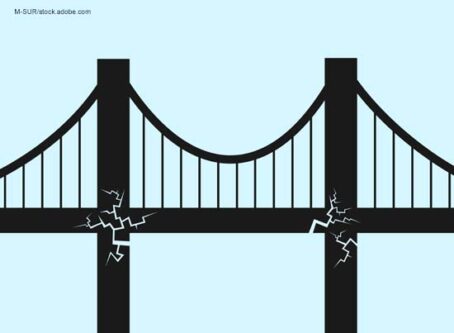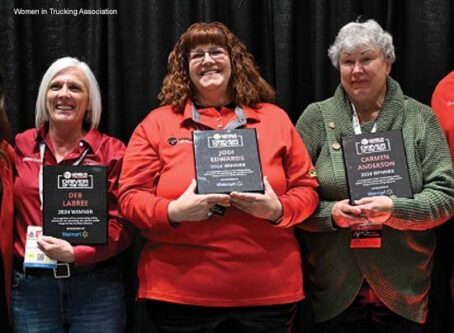Jersey Jim starts a trucking business
The recession of 1974 doesn’t compare with what’s happening now, but it cost me my good-paying Teamster job driving for A-P-A Transport, an LTL carrier in north New Jersey. With a young family, I had no choice but to accept a lower-paying sales job when it was offered by Riteway Express, a competing LTL.
I was selling for Riteway in 1978 when I met Jim Davis, a high-energy North Jersey guy who had driven for a nonunion carrier for two months. That job taught him everything he needed to know about trucking, he said.
Two years earlier, retailer Abraham & Straus had put Jim into the trucking business, in part by giving him freight to deliver and then by refusing to pay his legitimate freight bills. Jim loved telling the story.
I was sitting in a dusty art deco lobby above Colloids Inc., a chemical plant in Newark where I had an appointment with the traffic manager, an older guy named Thevenet. “Traffic” then meant what we now refer to as “logistics.” I was ready for Thevenet with good rates, free lunch, Yankees’ baseball tickets, whatever it took. But Thevenet was keeping me waiting.
That’s when Jim Davis bounded up the stairs from street level.
In his early thirties, he wore jeans, dirty work shoes, a genuine blue-collar shirt, and a pencil balanced behind one ear. He rapped on the receptionist’s sliding glass window. “Receiving is downstairs,” she said. But Davis said he had to talk to the traffic manager. His truck was blocking the dock downstairs, he said.
In less than a minute the elusive Mr. Thevenet appeared in the lobby. Salesmen could wait, but Thevenet did not mess with drivers – especially when they were blocking Colloids’ two freight doors. But this was no delivery problem.
Jim introduced himself as Jim the driver. He handed Thevenet a list of places where his company picked up and delivered. It was called a “points directory.” Every carrier had one back then. Jim’s company was Davis Square Trucking. Here was a guy in dungarees doing what I had come in a Robert Hall suit and a company Chevy to do.
Jim explained he was on Frelinghuysen Avenue every afternoon.
“I’ll never miss a pickup,” he said.
One of the toughest old officers in the Newark Traffic Club, Thevenet ate it up. He nodded, asked questions, and made notes in the points directory. Finally, Thevenet shook Jim-the-driver’s hand and turned to me.
“I’ll be with you in a minute,” he said.
Five minutes later, the receptionist called me in. Five minutes after that, I was back out on the street. Thevenet had taken my literature, thanked me for stopping by, and shown me the door.
Out on Frelinghuysen Avenue, there was no Davis Square truck in front of the dock. Instead, there was Jim the driver sitting behind the wheel of a faded Mustang, writing in a datebook.
“I thought you were a truck driver,” I said to him. He looked up and grinned.
“Nah. I’m the owner, but it’s a great bit,” he said.
We went to the diner where Jim Davis told me the story of Davis Square Trucking over coffee.
“Actually, it’s like Davis squared, me and my brother Greg. Two Davises, get it? Davis squared? Davis Square?”
Jim spoke with a heavy North Jersey accent – coffee was “cawfee” and her was “hu.” Jim was pretty slick, but probably not as slick as he thought he was.
Davis Square Trucking had a small terminal in Avenel. They had five guys driving for them, one tractor-trailer and four straight jobs. Greg ran the office, and Jim was on the road drumming up business. It was all about opportunity, and they were growing fast in unregulated New Jersey, Jim said.
Opportunity had bubbled up during the UPS strike of 1976, he explained. Many shippers were left without service – the Abraham & Straus warehouse down in Raritan Center, for example. Abraham & Straus, or A&S as it was known, would be swallowed by Macy’s in 1994. But in 1976, they shipped stuff all over New York and North Jersey, and they were jammed up, according to Jim Davis. I should have asked why a department store was shipping parcels all over the place, but it never occurred to me.
At that point, I still believed what Jim said.
Jim said he skipped the front door, the lobby, and receptionist at the A&S warehouse and went around back. He told the dock boss that he and his brother Greg would rent a couple of vans, pick up packages, and deliver them at the same prices UPS charged. The dock boss brought him to the warehouse manager, who was under pressure to get stuff delivered. The warehouse manager was overjoyed with Jim’s offer.
A&S stuffed Jim and Greg’s rented vans with as many parcels as possible and gave them the paperwork. The Davis boys didn’t have to sign for anything; that would have taken time. Just bring back the documents, and they would be paid based on the signed delivery receipts, A&S said. Sounded reasonable.
The brothers drove home and spread the packages on the lawn. Then they reloaded them in practical delivery order and set about delivering. There was a problem right away. Many people weren’t home during the day and they needed signed delivery receipts to be paid. He and Greg left a few packages and fudged signatures, but they couldn’t do that too much without arousing suspicion. They couldn’t do it at all with COD deliveries.
If UPS couldn’t deliver something, they left a card with a number to call.
These two guys didn’t have the time or facilities to do that. Instead they delivered into the night, even as late as midnight. They woke up more than a few consignees and collected those CODs. They also brought back refused and undeliverable shipments. But the dock boss wouldn’t accept anything back. He had no space. He told them to hold onto the cash and delivery receipts. They would process everything at once and square up later. The stuff went into Jim’s garage.
Two weeks later, UPS came back to work. Now Jim and Greg were due more than $1,350 for their work. But the still-hassled traffic manager said he didn’t have anything to do with invoices or cash. That all came out of the main office in New York. Jim took their paperwork to New York. The VP in charge of traffic sent out a rate clerk to say they had no record of two Davises and no idea what was going on. He wouldn’t pay even with a stack of signed delivery receipts. They needed corroborating records from the warehouse.
But the poor warehouse manager had quit.
The new guy said there were no such documents. The VP refused to cut a check without them. Of course, Jersey Jim was a shrewd guy. He refused to surrender the delivery receipts or the CODs they had collected without a check. It was a stand-off. In the chaos of the UPS strike aftermath, the A&S traffic VP turned to more urgent business. The episode faded in the chaos.
Jim and Greg still had undelivered merchandise as well as those COD payments. Along with many checks was more than $3,400 in cash. So the Davis brothers stopped asking for money. Jim, and Greg sold what they could of the undelivered stuff and used the cash to buy an old, used truck. Davis Square Trucking was born, though Jim and Greg called it J&G at the time.
“A&S put us in business, man,” Jim said.
Why the name change from J&G to Davis Square? That’s another story.









